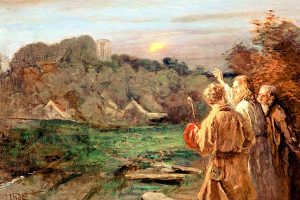Readings (Year B)
Isaiah 52:7-10
Psalms 98:1, 2-3, 3-4, 5-6
Hebrews 1:1-6
John 1:1-18
Reflection: At Christmas, life comes to us.
The joy of Christmas Day never ebbs in my family. The young and old alike celebrate this day with joy as gifts and food are shared to everyone’s surprise, elation, and gratitude. But for many families today, the usual gathering around the Christmas tree to exchange and unwrap gifts, the surprise on every face, and the sense of gratitude expressed as loved ones gather around the table for food is interspaced with a sense of sadness and emptiness because of COVID-19.
Jerusalem in today’s first reading is akin to the tragedy of COVID-19 as the pandemic continues to cause sorrow, isolation, and economic depression to families struggling with unemployment, hunger, and hopelessness. The inhabitants of Jerusalem were buried under the ruins of life in their beloved city. Their previous lives in the city—marked by prosperity, harmony, peace, and unity guaranteed by the presence of the Lord in the temple—were upended by a vicious enemy from Babylon.
The Book of Lamentation paints a sorrowful picture: “The roads to Zion mourn, for no one comes to the festivals; all her [borders] are desolate, her [leaders] groan; her young [ones] grieve” (1:4). Jerusalem became a city that invoked horror for those left to mourn its destruction.
Likewise, our neighborhoods, cities, and nation are in lamentation since COVID-19 became a pandemic, upending the life that we knew and cherished. Our streets are deserted while our hospitals are crowded. People huddle in isolation. Loved ones have lost jobs, businesses have closed their doors, and the dead have been buried and not ritually mourned. After a year, COVID-19 remains a lethal virus.
In a frightening state of despondency, the inhabitants of Jerusalem heard God’s word of restoration and comfort, pledging to redeem Jerusalem (52:8-9). The prophet summoned a people buried under the ruins of their city with the strength of his words of comfort. The prophet, identified as a bearer of good news, announces the presence of a savior, a redeemer and a comforter (52:7). God restores the city, comforts its inhabitants and redeems them from the hands of Babylon.
At Christmas we do not only hear God’s words of joy and peace; we experience the presence of God in our midst, Emmanuel. It is an experience of God’s presence among us through Jesus Christ that is life-giving: “What has come into being in him was life” (John 1:3-4). This life has an electrifying, vibrant, and animating effect as the light of humanity overpowering darkness and “darkness did not overcome it” (1:5).
The gospel reading from John reminds us about the tension between light and darkness, a conflict that has deep root in the ordering of creation. Now, the power of darkness in the form of COVID-19 has blanketed our world. Many of us know someone who did not survive COVID-19, or who has been out of a job and unable to find another, or who has developed mental illness as the pandemic diminishes our coping mechanisms. Under this cloud of darkness, let us hear the words of Isaiah summoning us to “see the salvation of our God” (Isa. 52:10) through Christ. Divine assurance is the vivid message of Christmas: God will not allow darkness to have the last word—COVID-19 will not defeat us. God’s empowering presence at Christmas makes it possible for us to experience grace (John 1:16). God’s gratuitous gift of grace to us is the life that has come to us at Christmas through Christ.
Christmastide is the fulfillment of God’s saving plan in the world, the beginning of God’s residence among us (1:14), the ultimate triumph of good over evil, and the beginning of the end of the forces of suffering and death. At Christmas, life comes to us. Hope is gifted to us and this hope will save us (Rom. 8:24).
Receive our weekly liturgical reflections in your inbox! Click the button below to sign up.













Add comment